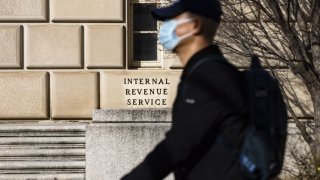
- The IRS isn't effectively targeting wealthy Americans in its tax-collection efforts, according to the Treasury Inspector General for Tax Administration.
- About 686,000 taxpayers who earn at least $200,000 a year had a combined $38.5 billion tax balance as of mid-May 2019, the watchdog found.
- Non-payment by the rich may lead to the belief that the U.S. tax system favors the wealthy, it said.
The IRS should police wealthy Americans who intentionally dodge their income taxes with more vigor, according to a report from the Treasury Inspector General for Tax Administration.
About 686,000 taxpayers who earn at least $200,000 a year had a combined $38.5 billion tax balance as of mid-May 2019, according to the watchdog.
Further, the agency collects less than 50% of tax debt owed by high-income taxpayers within a year of the case being assigned to an IRS tax collector, the report said.
Get a weekly recap of the latest San Francisco Bay Area housing news. Sign up for NBC Bay Area’s Housing Deconstructed newsletter.
More from Personal Finance:
How marginal and effective tax rates differ
A few days cost some businesses thousands on PPP loans
Jobless benefits in jeopardy for Americans stranded overseas
For example, high earners — those making at least $1.5 million a year — paid the IRS just 39% of the taxes they owed, on average, according to the audit. Such taxpayers still owed about $2.4 billion in delinquent tax.
"High-income taxpayer noncompliance can have a significant corrosive effect on overall tax administration as well as add to the belief that the nation's tax system favors the wealthy," according to the Inspector General report.
Money Report
It's important to determine how effectively the IRS is addressing delinquent taxes among the rich due to its limited staffing of experienced tax collectors, the report said.
Eric Hylton, commissioner of the IRS Small Business/Self-Employed Division, said the audit's findings are inaccurate and an incomplete representation of the facts.
For example, the conclusion that the rich paid 39% of owed tax, on average, only reflects what was paid within the first year of cases being assigned to a collection officer, he said.
"Some of these cases were still being actively worked at the end of the analysis period, and the analysis does not follow cases in their entirety," Hylton wrote. "Therefore, it cannot be used to determine what the IRS ultimately collects."
Tax debts
The IRS doesn't make taxpayer income a high priority when determining which cases to work, the Inspector General report said. The agency places greater significance on other factors, such as dollar amount of the tax balance.
But tax dollars owed isn't always an accurate identifier of the wealthy, according to the report. For example, the largest number of high-income taxpayers (69%) owe less than $25,000, the watchdog found.
"It is reasonable to believe that taxpayers earning millions of dollars can pay tax debts that total a very small fraction of that amount," the report said.
Wealthy Americans remain a "high priority" for the agency's tax collectors, Hylton said.
The IRS does, and will continue to, evaluate its predictive models to judge whether refinements could better target delinquent high-income taxpayers, he said.






